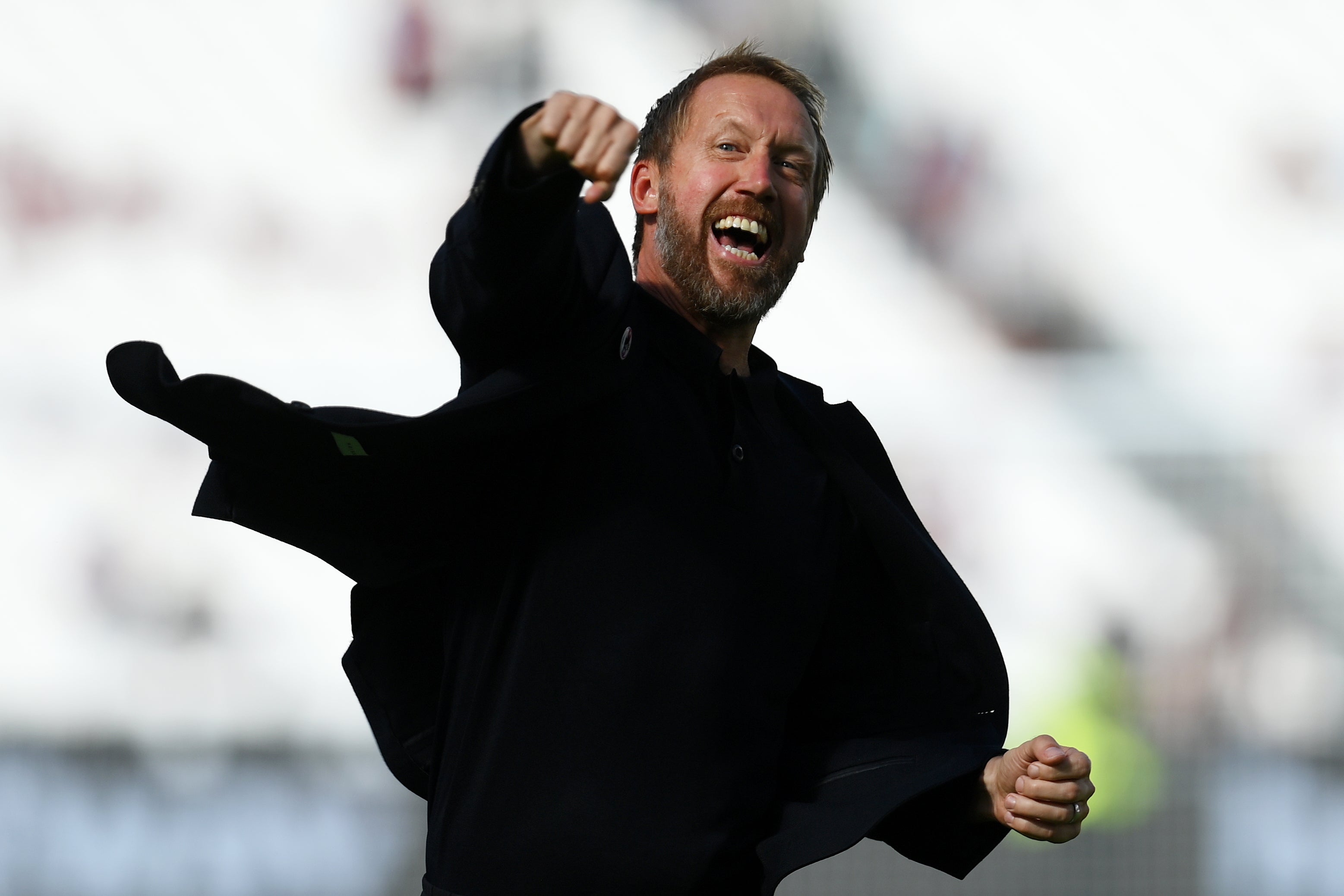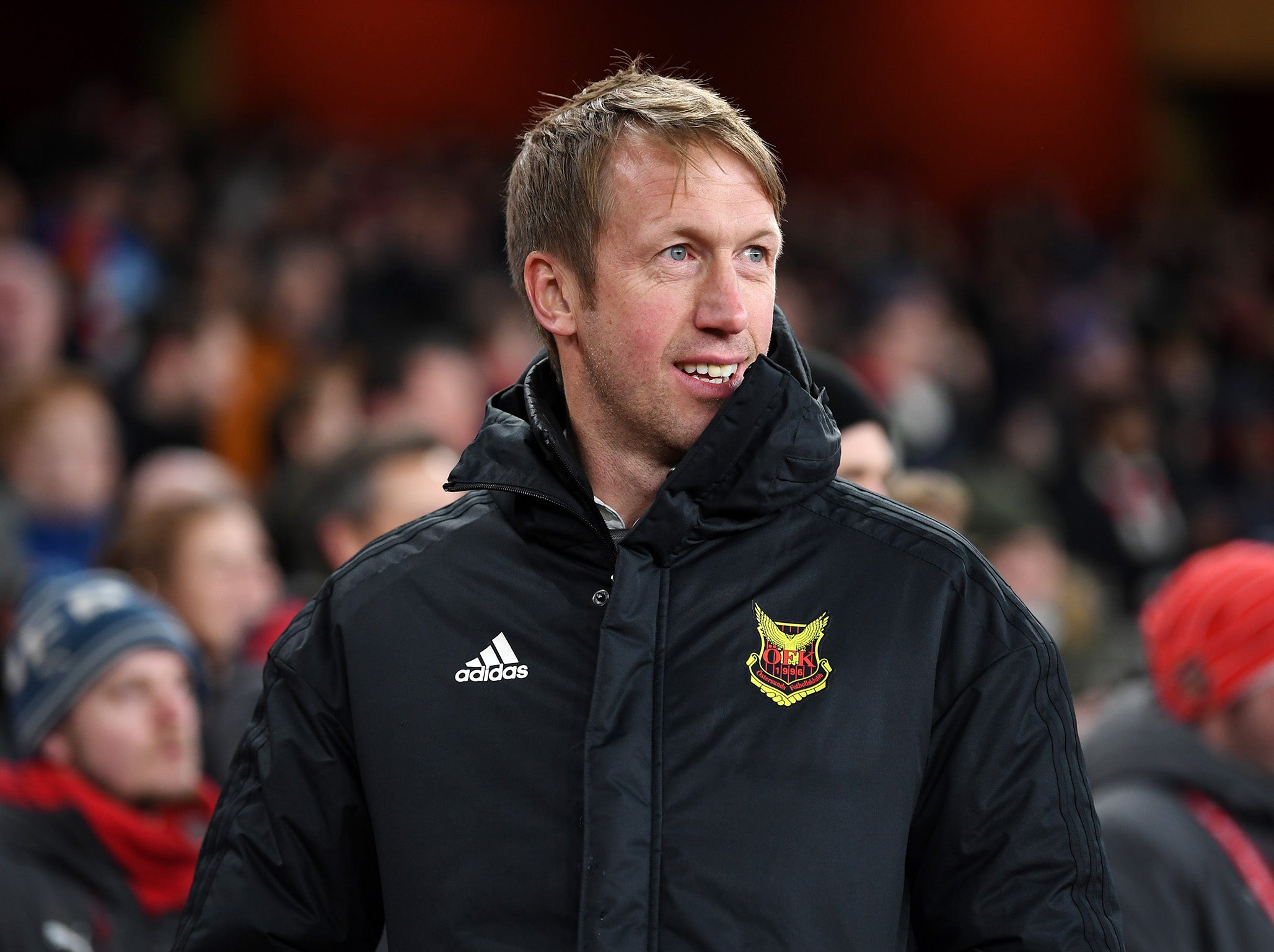Psychology, pressing and shapeshifting: What Graham Potter will bring to Chelsea
Potter honed his management skills in the Swedish wilderness where he discovered fostering unity was more important than a slick style of play

When Brighton and Hove Albion were lost in the darkness of a seven-game winless slump last winter, with a horror run of fixtures ahead, Graham Potter stayed remarkably calm. He didn’t make his players run harder or train longer, or pick apart their mistakes. Instead he gathered them in a room to discuss how they were feeling, and how they could harness their failure.
“He always tries to speak with us about psychological things,” Brighton’s Argentine midfielder Alexis MacAllister said recently. “He tries to do meetings for us to think about situations… it’s something not every manager does.” Results had put Potter under pressure and some of his more unusual decisions were inviting scrutiny, but he never lost the respect of his dressing room and never allowed a spiral of negativity to take hold. They responded with successive wins away at Arsenal and Spurs, and lost only once more all season in a spell that further elevated his reputation.
It is an approach that has taken Potter’s coaching journey from the yawning Swedish tundra to the gilded streets of west London, as he now takes on the Chelsea job. For all his tactical quirks and slick football, his ability to build unity is the backbone of his management. “Styles of play don’t make you win games,” Potter told The Coaches’ Voice. “The challenge is having players believe in it, how it works.”
After retiring from football at 30, Potter learnt much of his management techniques on a masters degree in leadership and emotional intelligence at Leeds Metropolitan University. A risk taker, he took a punt on a job in the Swedish fourth-tier dragging his reluctant family to the isolated city of Ostersund, trusting his skills to prevail in the most alien of environments with scant resources. Chelsea may be lacking a sporting director to run recruitment but that is unlikely to faze a manager who would drive nine hours out of the frozen wilderness to scout a single player.
His unusual methods – famously getting the Ostersund squad to put on a performance of Swan Lake for the local community – had binding effects on the band of misfits he persuaded to move there, and he connected with players on a personal level: captain and Iranian refugee Brwa Nouri described Potter as “one of the best men I’ve ever met”.
Potter made a huge impression on the Swedish town during his seven years there. “I remember the first year, I sat down and had a chat with Graham,” club secretary and one of Ostersund’s founding fathers, Lasse Lindin, told The Independent. “Most football coaches only talk about formations, but Graham was talking about the learning process and how to build a human being. He was totally different as a football coach. For me, as a former teacher, it was amazing. He understands that the players and the staff are humans, and knows how to get as much as possible from every individual without taking the group feeling away.”
Ostersund quickly climbed the leagues until they were outplaying some of the biggest clubs in Sweden. One of Potter’s victims was Henrik Larsson, whose Helsingborg side lost 2-0 in Ostersund’s first season in the top flight. “The way he was able to change his pattern of play during games was so impressive,” Larsson told The Independent. “They played all different kinds of systems, starting off a match one way, and then halfway through they started playing a different system, and then they ended up with a third system. And all the players knew exactly what they were doing.”
This tactical flexibility has become a hallmark of Potter’s teams. Chelsea are getting a highly intelligent coach who thinks outside the box – literally, given the only thing missing from Brighton’s play was often a killer finish in the area (only 29% of Brighton’s shots were on target last season, the third lowest in the division). His team’s malleable shape will be unusual at the top level – the formations of Jurgen Klopp, Pep Guardiola and Antonio Conte rarely change – and his track record suggests he will keep opponents guessing over tactics and selection. An example came last season when he flipped to a back four, surprising Liverpool, and earned a 2-2 draw at Anfield.

No team made more tackles in the final third than Brighton last season and so we may see Chelsea engage opponents higher up the pitch, as well as a dose of Potter pragmatism like the direct balls in behind Manchester United on the opening weekend. But broadly he carries similar traits to Tuchel, like the use of attacking wingbacks which will suit Reece James and Ben Chilwell, widening the game and leaving space between the lines for roving No 10s where it is not hard to imagine Mason Mount and Raheem Sterling. He has not been afraid to deploy players in new positions, like MacAllister remoulded as a deep-lying midfielder.
The changing of systems and personnel confounded Brighton fans at times, especially when it seemed like square pegs were being shoehorned into round holes or when a team sheet contained four centre-backs and no striker. Potter is extremely popular on the south coast but his relationship with supporters was occasionally strained, and he memorably chipped back when some booed the team after a draw with Leeds. “We’re sitting eighth in the Premier League but maybe I need a bit of a history lesson at this football club,” he said.
Perhaps he does not connect with fans in quite the same way as Klopp or Conte, nor does he rant and rave on the sideline, but it would be wrong to say Potter is cold or unemotional, and he has a lighter side. On one occasion at the end of last season he was ambushed by a friendly swarm of Brighton fans chanting “Potter, give us a song!” outside the Amex Stadium. He stopped in his tracks, hushed them with his hands, gave a long dramatic pause, then roared “Seeeeeagulls!” with a big grin and they burst into song.
A more demanding fanbase now awaits. Chelsea are by no means the perfect club: they have no director in the way Potter built a close relationship with Dan Ashworth at Brighton, the man who “aligned all the spokes of the wheel”. The recent summer transfer window would suggest Chelsea have little in the way of a clear recruitment policy either, something Potter benefitted from in his previous jobs.
But this is the perfect time. How much higher could he realistically have taken Brighton? For all his talents, could he really have overcome the financial chasm that exists between the top six and the rest? His stock may never have been greater than it is now; Brendan Rodgers failed to cash in at the high point of his Leicester rollercoaster and Potter would want to avoid that mistake.
There will be predictable questions over his ability to handle superstar players, giant egos, a bloated squad and relentless expectation. But more intriguing is the marriage between a loud, brash, ruthless football club and a humble, intelligent, thoughtful manager. Potter’s unflustered approach to coaching will at least buy him time, and time is currency at a club where the manager works with a sword dangling above his head.
Join our commenting forum
Join thought-provoking conversations, follow other Independent readers and see their replies
Comments


Bookmark popover
Removed from bookmarks